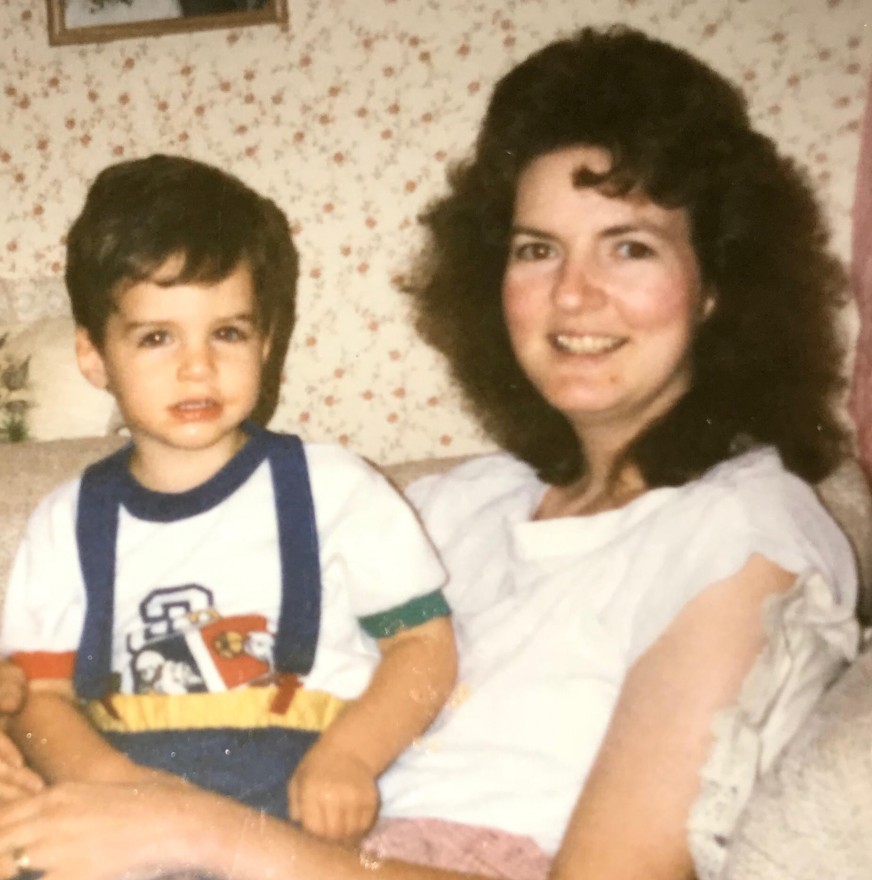
My mother and me before her accident.

My mother and me before her accident.
How could spring ever be silent while my mother sputters away into yet another coughing fit?
“Come ON, mom! We’re almost to the food court. You can rest there.” I forget I’m supposed to be patient and annoyed that we have to stop again.
“You don’t. Understand. How good. You have it, Bryan.”
But my byte-sized brain was hardwired like the Tamagotchi in my palm. I couldn’t fully grasp her humble wisdom until I learned over the years that the seeds of tragedy often take root, not by nature, but by the crooked hand of the farmer.
***
February 7, 1997. The day my mother knocked on Heaven’s Door, but God was out to lunch.
It was the day I learned about Union Carbide, the day 6-year-old sons all across America made craters out of dino-shaped nuggets and sipped Hi-C through bright yellow straws.
Thank God, she didn’t pass away in the accident. But I lost the memory of her healthy self before the accident. I can’t remember if it seeped away slowly like the gases she inhaled or blew away at once like that factory in Flixborough.
Well, that’s not entirely true. I still cradle the one memory I have left…
Saturday cartoons and blueberry Pop-Tarts.
Our fire scanner emits its usual screeches, clarion call signs that pierce the ether of the airwaves. It scares the hell out of me on a daily basis, a fear overshadowed by ire the older I get. Our hometown, Pine Bush, known more for ETs than EMTs, sits quietly amongst the bungalows of the Borscht Belt. Disaster always hits close to home here. It’s clear out, I think.
The siren song fills our house like the smoke billowing at the Cavanaugh’s across the street. Over my screams, Mom sprints down the wooden steps, the same ones I tumbled down the winter before, nightgown flying behind her.
I stand on the toilet, Superman socks struggling to grab hold, and peek through the tiny sliding window and my tears.
She enters the darkness. All I see is white.
Reds and Blues eventually appear, but not Mom. You don’t know how good you have it, Bryan.
Amongst the commotion, I can hear that one rerun where Arnold returns safely home from the fiery underworld. Are happy endings only confined to cartoons? Will I be sent to a foster home? How—
—and there she is!
Strapped to Mom’s back is the stout matriarch, Mrs. Cavanaugh, too frail and heavyset to wheel herself to safety. Mom breathes in the crisp Catskill air and sets her down on a stretcher. She is safe. I cry on her shoulder and tell her I never want to lose her.
To this day, Mom’s certificate from Governor Pataki still hangs on the wall of our family room.
***
Methyl isocyanate. The source of her suffering.
As a first-grader, I shouldn’t be able to spell it or recite by heart its chemical compound, CH3NCO. I shouldn’t know that it’s a chemical intermediate for the production of carbamate insecticides or that its vapors are as colorless as the bodies of Bhopal.
I shouldn’t know that adults are capable of evil. That they will make Mom cry in court after she sues. Or call her a lying witch. Or try to intimidate her by flashing laser pointers in my eyes when she runs into the store for Wonderbread.
I shouldn’t know what she knows now. That those two sick truckers she drove to the hospital also winced with watery eyes and writhed with stinging throats. That the vomit-ringed bathroom where she found them bordered a secret storage closet. That several “sealed” drums sat damaged there inside, belching noxious fumes through the vents above. That my mom and her team of paramedics would dance with death that night.
And that Oro Freight, which ships these chemical containers to every corner of the country, would deny responsibility for the accident at all costs.
But I’m all she’s got in this world and so I do.
As her caring hand guides me around life’s little obstacles—stopping often along the way—I begin to take care of her too and absorb her sense of service with each new breath.
***
Never again, you tell yourself. How many more must be killed or disabled?
But hollow words ring loudest.
What do you do when your nourishment is nurtured by your nemesis? Can you stomach the potatoes on your plate when the pesticides that protect them come from methyl isocyanate?
Do you chew on your existential angst, dip it in ketchup, and swallow?
No. You grow your food like you’ve grown into manhood: organically, and with purpose.